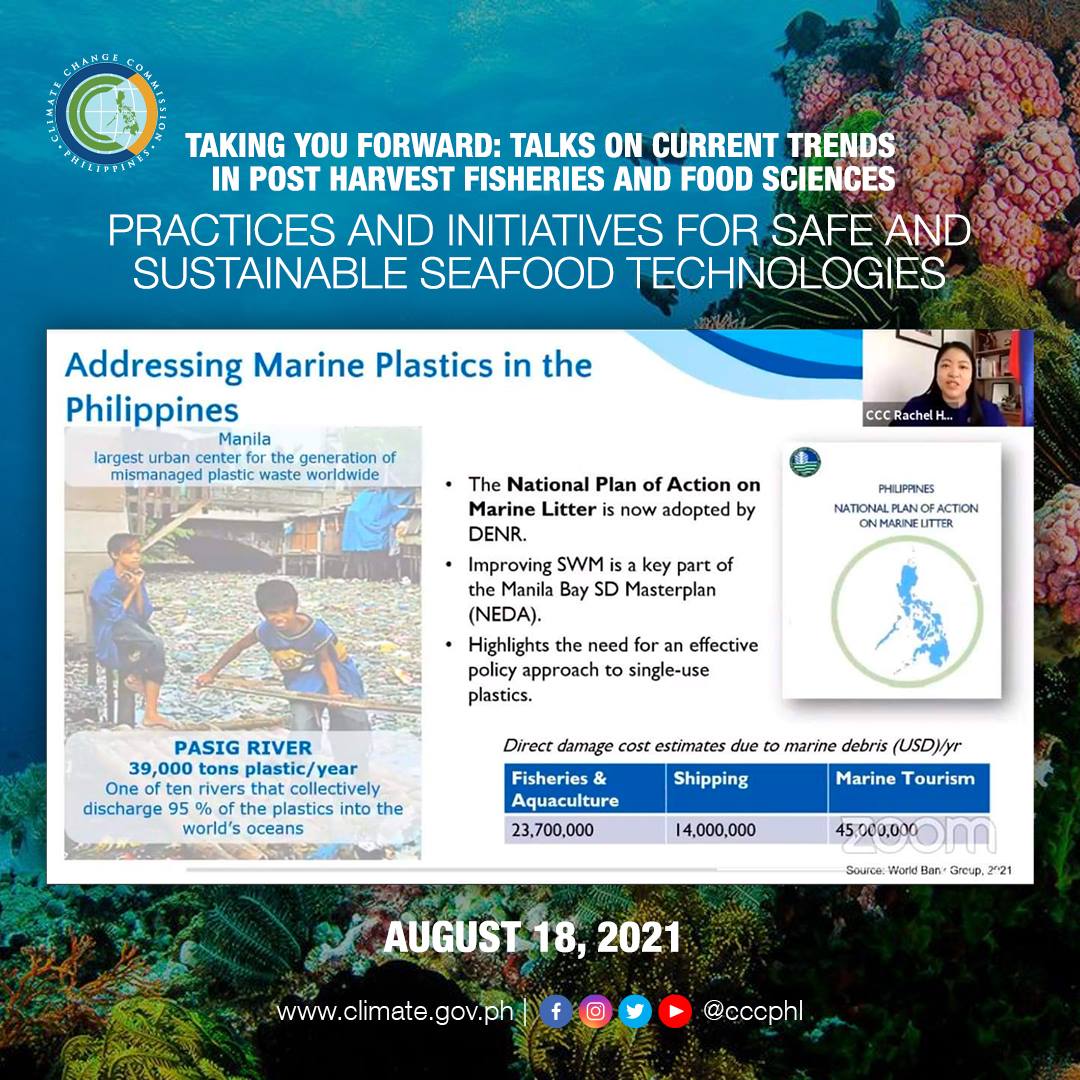
August 18, 2021 Wednesday

CCC Commissioner Rachel Anne S. Herrera presented the country’s National Plan of Action on Marine Liter adopted by the Department of the Environment and Natural Resources which includes a policy approach to address problems with single-use plastics.
MANILA, 19 AUGUST 2021 — The Climate Change Commission and UN Global Champion for Resilience, House Deputy Speaker Loren Legarda, called for urgent action towards sustainable consumption and production to protect both marine and human life, in an online forum on seafood safety and sustainable packaging for seafood products on Wednesday, August 18.
As keynote speaker, Deputy Speaker Legarda highlighted the threats faced by the fisheries sector and related industries due to climate change, driven in part by the production, consumption, and disposal of single-use plastics, which the pandemic also worsened.
“Our throwaway, consumptive, wasteful culture is directly threatening marine life, with fish, seabirds, sea turtles, and marine mammals getting entangled in or even ingesting plastics,” she said.
“The problem is how to solve this—and it’s set to worsen: in 2017, we found that we produced as much plastic in the past 13 years than we did in the previous half-century. At that rate, we will end up with more plastic than fish in the oceans by 2050—oceans so acidic that farmed fish yield could be reduced by, believe it or not, 90%,” Legarda warned.
“As a nation of many islands, our economy and our culture have depended on fisheries for decades, if not centuries. Our lives are indelibly linked to the ocean, inextricably linked to its resources. We must act now, with urgency and resolve, to ensure the ocean’s protection for the fisherfolk, for the sectors that depend on them—and not just for them, but for all Filipinos, now and in the future,” Legarda added.
From the CCC, Commissioner Rachel Herrera presented government initiatives on circular economy and sustainable consumption and production, including the campaign for the passage of a national law to regulate single-use plastic products through the Cabinet Cluster on Climate Change Adaptation, Mitigation and Disaster Risk Reduction; crafting the regional Framework on Circular Economy for the ASEAN Economic Community; legislative efforts to promote circular economy and sustainable consumption initiatives; the Philippine Action Plan for Sustainable Consumption and Production (PAP4SCP); the National Ecolabeling Program–Green Choice Philippines; the National Plan of Action for the Prevention, Reduction, and Management of Marine Litter (NPOA-ML); and efforts to drive investments in sustainability and circularity through the country’s Strategic Investment Priority Plan.
“We are meeting today with urgent work ahead of us, because there is a report just released last week by the United Nations body of climate scientists, the Intergovernmental Panel on Climate Change, and this report has been described as ‘code red for humanity,’” said Herrera. “We can no longer stop climate change—and many of these effects or impacts are felt much more severely here in the Philippines. As our climate scientists note, sea levels here at home may be rising four times greater than the global average,” she added.
According to Herrera, while the report’s outlook is grim, “it also gives us hope that we can still avert the worst impacts of climate change if we act now, and immediate steps are needed”—including deep cuts in greenhouse gas emissions, and shifting towards a circular economy and sustainable consumption and production.
“All of this work becomes even more urgent not just because we are in a climate emergency, but because we are in a pandemic,” Herrera noted.
Hosted by the Institute of Fish Processing Technology of the University of the Philippines Visayas College of Fisheries and Ocean Sciences, the forum tackled current trends in post-harvest fisheries and food science. College Dean Prof. Encarnacion Emilia Yap remarked that, "There are some potentially carcinogenic substances which are absorbed by microplastics. So, if the microplastic is in one particular organism, the effect of microplastic is actually compounded by the absorption of other chemicals to the microplastics, thereby [doubling the problem of microplastics.]"
"We (CFOS) are totally in support of the Bill. As early as 2018, we've been doing this... Consider us as your warriors in our fight against the plastic pollution,” Dean Yap added.
Other speakers for the webinar included Mary Ann Galenzoga-Basal of NSF International, who discussed food safety especially of seafood products during the pandemic.